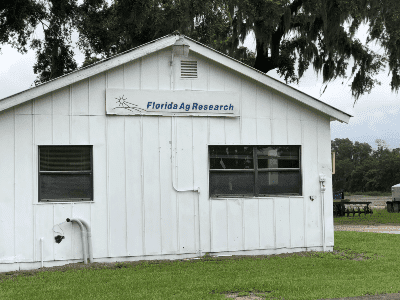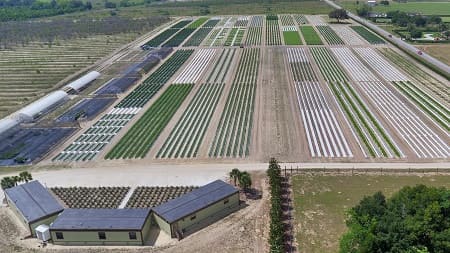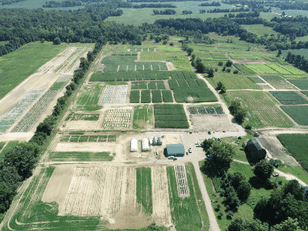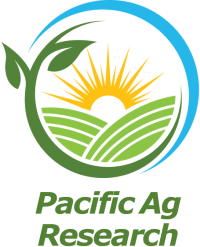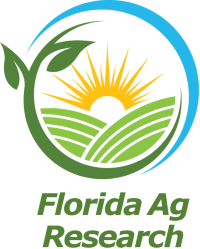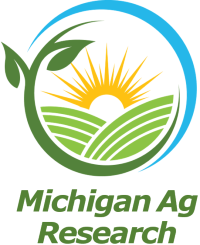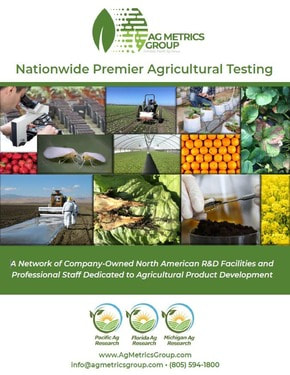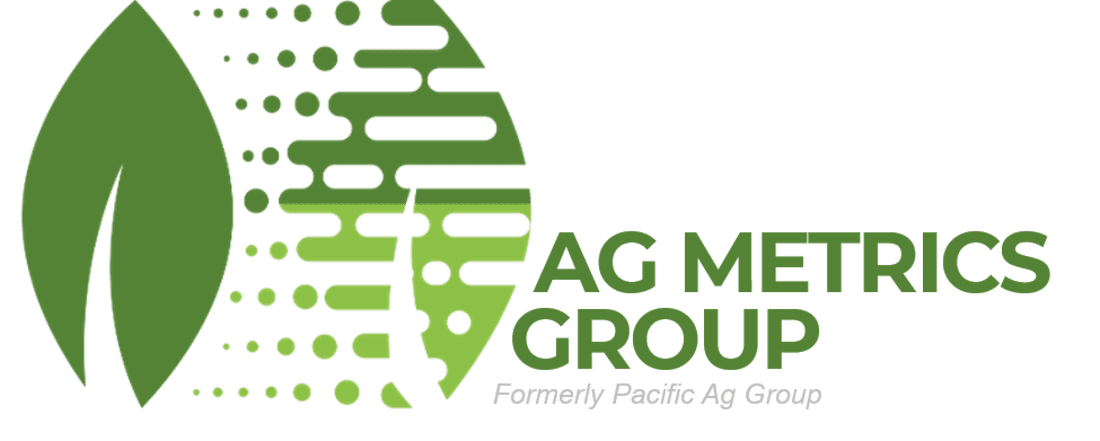Over 40 Years of Best in Class Agricultural Research
For many years, Ag Metrics Group (formerly Pacific Ag Group) has managed a growing portfolio of field and laboratory research in three major North American agricultural districts: The West, Southeast, and Midwest. In each area there are local crop issues, new experimental techniques, and relevant scientific findings integral to our science programs that were learned over many years in the crop research industry.
Here is our story...
1980
Pacific Agricultural Laboratories Inc.
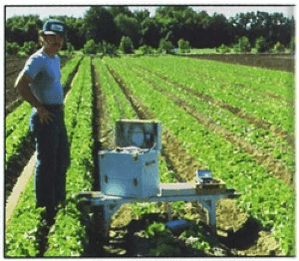 Frank Sances demonstrates use of porometer in lettuce field, c. 1981
Frank Sances demonstrates use of porometer in lettuce field, c. 1981
The Ag Metrics Group began in 1980 as Pacific Agricultural Laboratories, Inc., a San Diego based consulting and analytical laboratory providing professional services to the Southern California agricultural community. In these early years, Integrated Pest Management (IPM) was in its infancy, and “Pacific Ag Lab” was an early pioneer in this field of professional pest and crop nutrition management.
In the 80's, the company grew to include the Oceanside, CA offices and agronomy laboratory, and in 1984, a plant pathology laboratory in Fallbrook, CA, that focused on soil borne diseases of avocado and citrus. During this time, crop management services included most of the high value crops in the California and Arizona region, and south into Mexico and Latin America. Tomatoes, strawberries, mixed vegetables, wine and table grapes, avocado and citrus, and many other regional crops were managed by a team of young agronomists.
Laboratory services included soil and plant tissue analysis, as well as plant disease diagnostics and new product development research. This field investigations service began with evaluations of new pest control products for grower groups and product manufacturers, and grew into a comprehensive bio-efficacy, environmental fate, and crop genetics research program that became the hallmark of the company’s activities.
In the 80's, the company grew to include the Oceanside, CA offices and agronomy laboratory, and in 1984, a plant pathology laboratory in Fallbrook, CA, that focused on soil borne diseases of avocado and citrus. During this time, crop management services included most of the high value crops in the California and Arizona region, and south into Mexico and Latin America. Tomatoes, strawberries, mixed vegetables, wine and table grapes, avocado and citrus, and many other regional crops were managed by a team of young agronomists.
Laboratory services included soil and plant tissue analysis, as well as plant disease diagnostics and new product development research. This field investigations service began with evaluations of new pest control products for grower groups and product manufacturers, and grew into a comprehensive bio-efficacy, environmental fate, and crop genetics research program that became the hallmark of the company’s activities.
To reflect this research emphasis, in 1990 the company name was officially changed to Pacific Ag Research Corporation (“Pacific Ag Research”). Since then, the company focus has been on scientific investigations in plant sciences, ag-product development research, and technical support to cooperatives and grower groups.
1994
Relocation to San Luis Obispo Headquarters
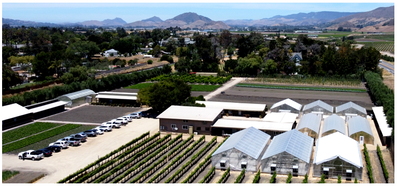
With increasing urbanization in Southern California, and San Diego in particular, in 1994 Pacific Ag Research moved the corporate offices to Central California near San Luis Obispo and established a private research center in the Edna Valley. Here, over the next 2 decades, company laboratories, greenhouses, and field operations conducted thousands of crop experiments with plant diseases, insect pests, crop nutrition, environmental studies, and new crop genetics. Company clientele included product manufacturers, academic institutions, grower cooperatives, and government. From the San Luis Obispo headquarters, additional California research farms were established near Fresno, Salinas, Santa Maria, and Yuma, Arizona. During this period, the research staff continued to publish and contribute to agricultural science across several disciplines. Owing to its multiple locations, the company became known as "Pacific Ag Group," representing the leading group of research facilities and staff in the Western U.S.
|
Since the early years, the company’s extension and research activities involved collaborative projects in the Eastern US. This was particularly true in Florida, where many of the company’s California based strawberry, tomato, and citrus research needs are common among all U.S. production districts. Initially, these eastern US projects were managed from the Central California headquarters, but ultimately, as projects grew in complexity and size, a Central Florida facility was established in 2007 in Dover, FL. This regional office was named Florida Ag Research, and was later expanded in 2010, to include a second site in Thonotosassa. On this 50 acre site, the company’s Southeast headquarters was developed with offices, laboratories, and greenhouses, surrounded by intensively managed premium Florida farmland. While the Dover research farm is maintained for its different soil and microclimate, both on and off-site projects are managed from the headquarters in Thonotosassa. Field research on other Southern U.S. crops include sugar cane, tropical fruits, turf and ornamentals, and off-season winter breeding for Midwest corn, soybeans, and grains. Currently Florida Ag Research is the largest CRO in the southeastern U.S., and the staff maintains an active extension and applied research program with grower cooperatives throughout the region.
|
|
As with Florida Ag Research, over the years, Pacific Ag periodically managed field research in the Great Lakes and Midwest farming regions. These activities grew until 2014, when a third regional research group was established in Southern Michigan. Michigan Ag Research began with a 50-acre experimental farm and small pathology laboratory in support of new product development field trials. From the beginning, Michigan Ag’s focus is field, fruit, vegetable and horticultural cropping challenges of the Great Lakes region. These operations are currently over 200 acres of premium farmland with all required machinery and farm staff that manage field trials to high commercial standards. Laboratories, year-round greenhouses, and multi-disciplined researchers conduct hundreds of field and lab experiments annually. In 2015, Michigan Ag added a second site in Sunfield, Michigan, where soil-borne diseases of corn and soybean are studied, along with GMO tolerant Corn Root Worm populations. Of added benefit, the Michigan office also conducts trials for Canadian product registrations, since field research completed in this area satisfies Agriculture Canada’s Region 5 requirements.
|
2020
Name Change to Ag Metrics Group
Centralized Science and Project Management

In 2020, Pacific Ag Group, Inc. corporate name was changed to Ag Metrics Group, Inc., to better describe a diversified Contract Research Organizations (CRO) coordinating scientific activities for groups across North America. It is the same company that began as Pacific Agricultural Laboratories, Inc. in San Diego in 1980, but as the name implies, is now a comprehensive scientific investigations group that manages contracted experiments, data collection, and scientific analysis for a diverse clientele, in company owned research centers nationally. The advantage of a R&D business model of this type becomes apparent to the research sponsor, where a single scientific source represents a broad geographic reach across North America.
Ag Metrics Group conducts product development and other crop improvement research in nationally distributed markets with harmonized testing protocols, interconnected scientific staff, and firsthand knowledge of local conditions affecting results. Project management is centralized but locally knowledgeable. For example, clients with a plant pathology project focus can interact simultaneously with 3 qualified plant pathologists representing vastly different growing regions within the same parent company. This is also true of entomology and agronomy related research, where each regional group has separate scientific staff, laboratories, and locally knowledgeable field researchers. In many cases, a single interaction with a national research team such as we have created, can simplify and accelerate progress of a national product development program or any other scientific endeavor.
Ag Metrics Group conducts product development and other crop improvement research in nationally distributed markets with harmonized testing protocols, interconnected scientific staff, and firsthand knowledge of local conditions affecting results. Project management is centralized but locally knowledgeable. For example, clients with a plant pathology project focus can interact simultaneously with 3 qualified plant pathologists representing vastly different growing regions within the same parent company. This is also true of entomology and agronomy related research, where each regional group has separate scientific staff, laboratories, and locally knowledgeable field researchers. In many cases, a single interaction with a national research team such as we have created, can simplify and accelerate progress of a national product development program or any other scientific endeavor.
|
|



